National Curriculum of England & Wales
The National Curriculum of England & Wales begins at the Early Years Foundation Stage for children age three to five, progressing to the highly respected IGCSE qualifications for older students.
Verita offers rigorous, internationally-recognised curricula and qualifications including the National Curriculum of England & Wales. We believe that this provides your child with a global education passport, equipping them to study anywhere in the world.
In our Early Childhood (EC2) programme until the end of Keystage 3 (Year 9), Verita uses Fieldworks three international curriculums to deliver the National Curriculum of England and Wales.
The International Early Years Curriculum (IEYC), International Primary Curriculum (IPC) and International Middle Years Curriculum (IMYC) are designed for a new world of opportunity. Your child will learn big themes that will help them to develop subject knowledge and a sense of the world around them.
These strong and adaptable curricula set students personal and subject goals, combining subject teaching with a focus on values and resilience. As well as languages, arts, sports and specialist subjects, your child will explore traits such as morality, communication, inquiry and respect.

Full accreditation from the Council of International Schools (CIS)
Council of International Schools community (CIS) is a leader of school evaluation and accreditation worldwide. They provide a unique international accreditation with a focus on student learning and global citizenship.
Their accreditation drives a school’s continuous improvement, through rigorous evaluation against internationally-agreed standards through a peer-based model that brings together international educators from across the world of CIS-Accredited schools.
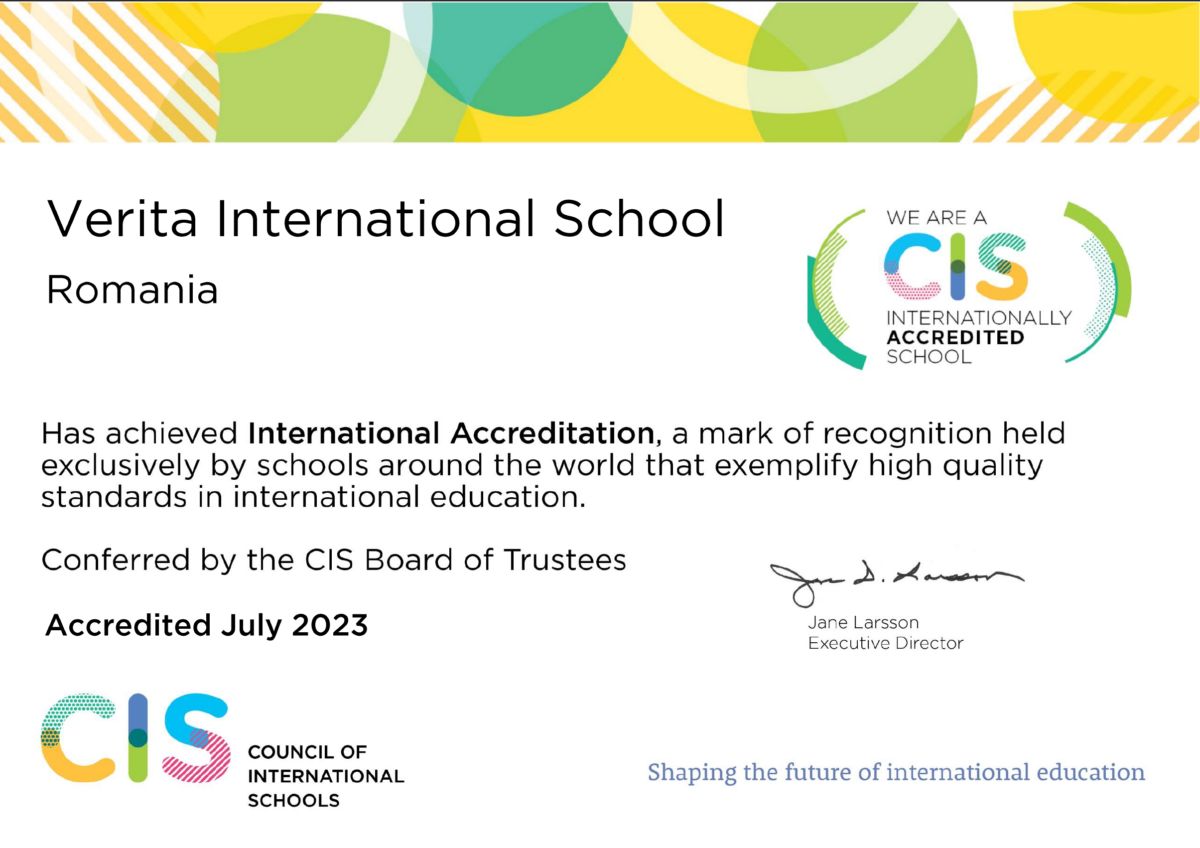
COBIS Accredited Member School

The Council of British International Schools (COBIS) is an accreditation association that represents more than 450 schools and organizations, globally.
A fundamental aim of COBIS is to support its members and represent their interests in Britain and overseas, particularly with Government, education authorities, and educational associations. We are committed to advancing the interests of British schools overseas and the commercial organizations that export education resources, products, and services. We work closely and in partnership with the Department for International Trade and the Department for Education.

International Baccalaureate
Diploma Programme (IB DP| Ages 16-18)
Verita International School is an authorized IB World School for the Diploma Programme. The International Baccalaureate (IB) Diploma Programme (DP) is a demanding 2-year curriculum designed for Year 12 and 13 students. It is the industry gold standard for a high school diploma and is considered the global passport to universities worldwide.
The DP programme is comprised of six subject groups and three core components (CAS, TOK, EE). The six subjects are offered in a standard level (SL) or higher level (HL). HL courses may be used as credits towards first-year university courses. The three core components are Theory of Knowledge (TOK), Extended Essay (EE) and Creativity, Action & Service (CAS).
At the end of the two years, students will complete a range of assessments and exams for each subject group which is externally assessed by the IB DP. They will also need to complete their CAS, TOK and EE components in order to attain the IB DP diploma.
The six subject groups are:
- Group 1: Studies in Language and Literature
- Group 2: Language Acquisition
- Group 3: Individuals and Societies
- Group 4: Sciences
- Group 5: Mathematics
- Group 6: The Arts
As an IB World School offering the Diploma Programme, we are part of a global community of schools committed to developing knowledgeable, caring young people who will be ready to negotiate their futures successfully and make contributions resulting in a more harmonious and peaceful world.
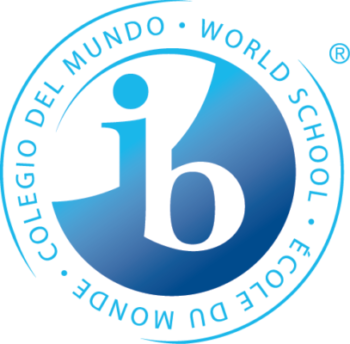
International General
Certificate of Education(IGCSE | Ages 14-16)
Verita is an approved examination centre that has been granted recognition to conduct International GCSE examinations with Pearson for its students or guests students from other schools.
Pearson Edexcel International General Certificate (iGCSEs) are globally recognized qualifications with academic content and assessment designed specifically for international learners.
The Edexcel iGCSE subjects are designed to be taught over two years for Year 10 and Year 11 students. The subjects (qualifications) cover a plethora of content which will set the foundation for students to succeed in Year 12/13. At the end of Year 11, students will partake in a series of externally assessed and moderated assessments from Edexcel.
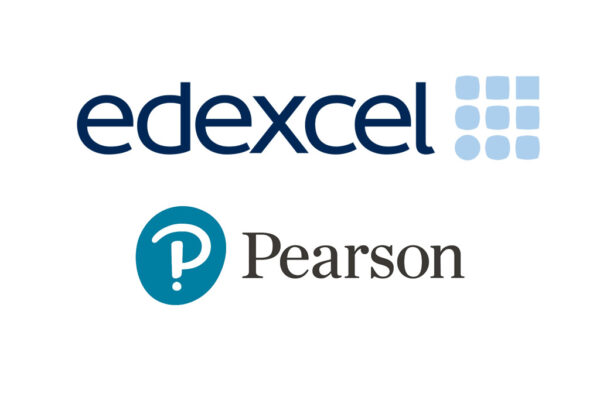
GL Assessment
As part of our commitment to providing high-quality assessments that align with British National standards, we have adopted the GL assessment system. The GL assessments offer tailored approach to measuring student progress and identifying areas for improvement, ensuring that our students receive the support they need to succeed in their academic journey. Read more here.

International Middle Years Curriculum (IMYC | Ages 11-14)
The IMYC focuses on building skills that students will need as they move toward adulthood, enabling them to make sense of what they are learning, as well as to connect and collaborate with others. The IMYC is based on neuroscientific research of what the adolescent brain requires by following a specific process of learning that helps your child to become a better organiser and planner.
Each unit has a theme that helps students to engage with subjects from adaptability to identity, curiosity, tradition and discovery. These Big Idea challenges push students to think broader and to connect subjects and themes together in new ways.
Students will be set learning goals that will develop knowledge, skills and understanding, personal goals that help them connect and grow, and international learning goals that give students a clearer sense of their place in a global community.
For more information about the IPC visit their website.
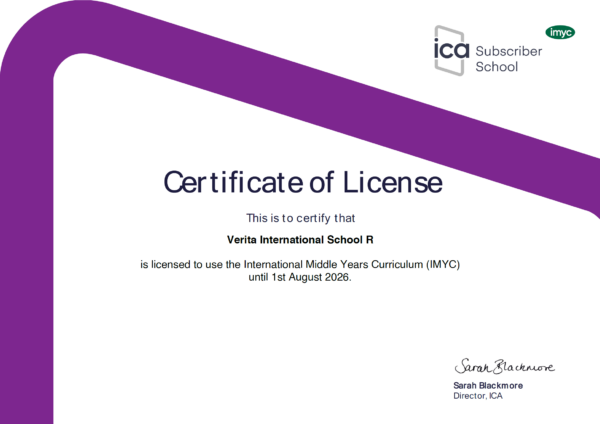
International Primary Curriculum (IPC | Ages 6-11)
The International Primary Curriculum (IPC) is used in nearly 1,800 national and international schools from all over the world. Learning with the IPC means that children focus on a combination of academic, personal and international learning that is exciting and challenging. The IPC aims to help every child enjoy learning a wide range of subjects and to develop an inquiring mind, the personal attributes that will help throughout teenage and adult years.
Through the IPC approach to learning children develop the knowledge, skills and understanding necessary to confidently face the world of tomorrow. They develop a sense of his or her own nationality and culture, at the same time developing a profound respect for the nationalities and cultures of others.
For more information about the IPC visit their website.
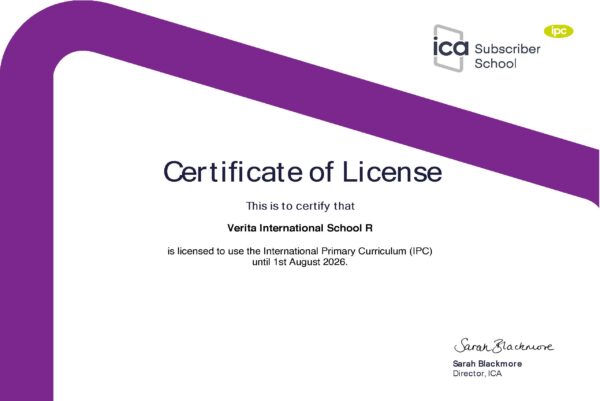
International Early Years Curriculum (IEYC | Ages 2.8-5)
The IEYC uses international best practices, holistic inquiry and play-based approaches that cover all curriculum areas, including personal, social and emotional development.
Informed by new research, and feedback from schools around the world, the IEYC was developed to meet the needs of children at this crucial stage of their development.
For more information about the IEYC visit their website.
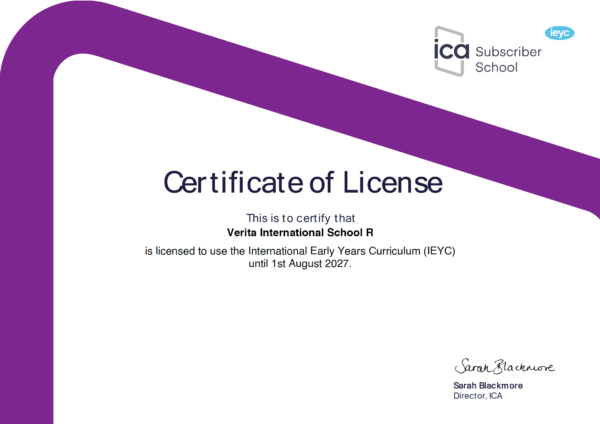
Ready to send your child on
the learning adventure of a lifetime?
We develop your child’s talents, build meaningful relationships in a safe environment, and make learning enjoyable. If you’re seeking an international, English-speaking school that encourages independence, creativity, and prepares children to thrive in a global world, Verita School is the perfect choice for your family.
